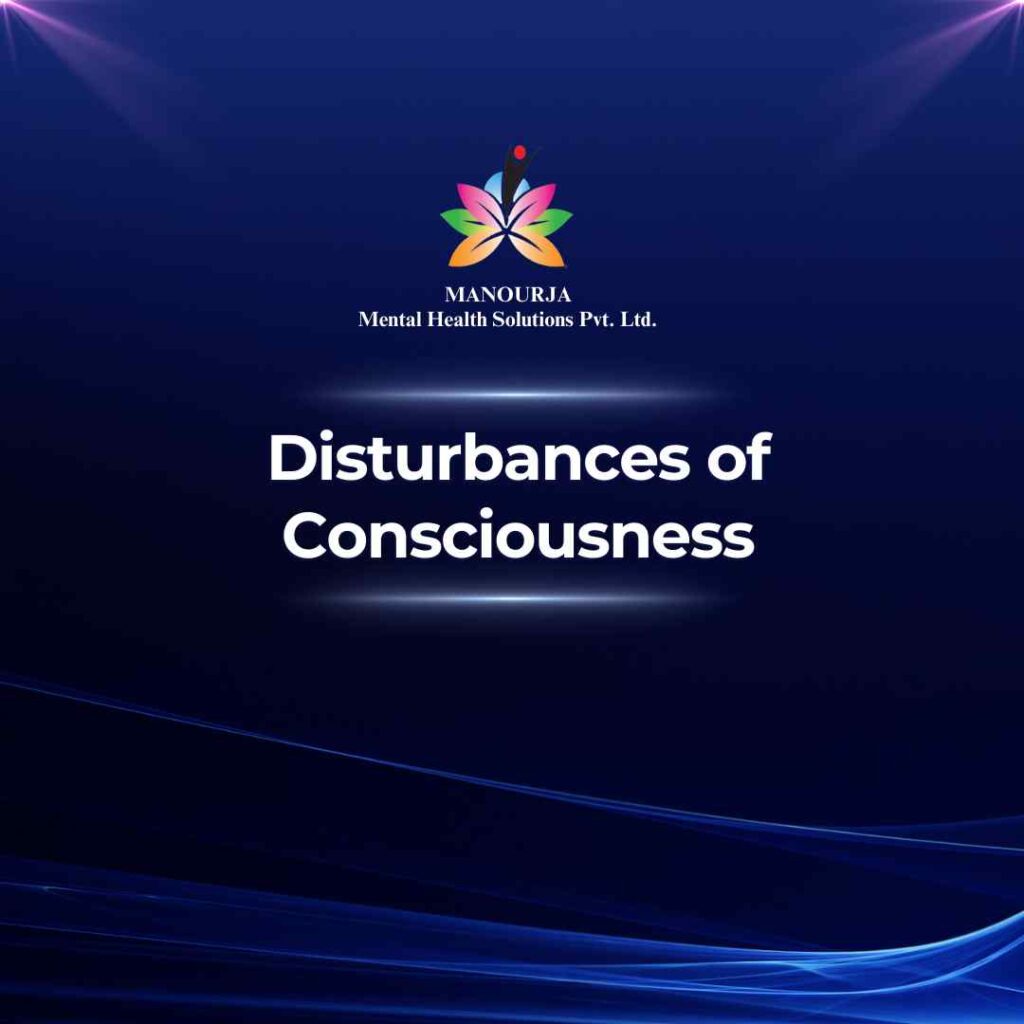Disturbances of Consciousness

Disturbances of consciousness refer to abnormalities in the level or clarity of awareness of oneself and the environment. These disturbances can range from slight confusion to complete unresponsiveness. They impact a person’s ability to interact with their surroundings, maintain attention, and respond appropriately to stimuli. Consciousness is a continuum that includes various states, from full alertness to deep coma.
Disturbances of Consciousness as a Sign and Symptom of Mental Illness
Disturbances of consciousness can manifest in various forms, including:
- Confusion: Disorientation regarding time, place, or person, often with impaired memory and understanding.
- Drowsiness: Reduced level of alertness, with a tendency to fall asleep.
- Stupor: A state of near-unconsciousness or insensibility, where a person can only be aroused with vigorous and repeated stimuli.
- Coma: A state of deep unconsciousness from which a person cannot be aroused.
- Delirium: An acute, often fluctuating state of confusion with disturbed attention, perception, and cognition.
- Clouding of Consciousness: Reduced clarity of awareness, with a diminished capacity to focus, sustain, or shift attention.
- Altered States of Consciousness: Includes various non-ordinary states such as dissociation, depersonalization, and derealization.
Mental Illnesses Where These Disturbances Are Present
Delirium is acute and fluctuating disturbance of consciousness and cognition. Individuals may experience confusion, disorientation, and impaired awareness, often resulting from medical conditions, infections, substance intoxication, or withdrawal.
In advanced stages of dementia, individuals may exhibit disturbances of consciousness, including confusion and disorientation. These disturbances are often progressive and worsen over time as the disease affects more areas of the brain.
- Substance Intoxication and Withdrawal
Certain substances, such as alcohol, benzodiazepines, and recreational drugs, can cause disturbances of consciousness. Intoxication may lead to confusion, stupor, or coma, while withdrawal can result in delirium or other altered states of consciousness.
- Traumatic Brain Injury (TBI)
TBI can cause various levels of disturbances of consciousness, ranging from mild confusion and disorientation to severe cases of stupor or coma, depending on the severity and location of the injury.
- Epilepsy
Seizures in epilepsy can lead to transient disturbances of consciousness. During and immediately after a seizure, individuals may experience confusion, disorientation, or even brief periods of unresponsiveness.
In severe cases of schizophrenia and other psychotic disorders, individuals may experience disturbances in consciousness, particularly during acute episodes of psychosis. This can manifest as confusion, disorientation, or clouding of consciousness.
- Dissociative Disorders
Dissociative disorders, such as Dissociative Identity Disorder (DID) or Dissociative Amnesia, can involve altered states of consciousness, including depersonalization and derealization, where individuals feel disconnected from themselves or their surroundings.
- Severe Depression
In some cases of severe depression, individuals may exhibit psychomotor retardation and stupor, presenting as significantly reduced responsiveness to the environment and difficulty maintaining consciousness.
Catatonia, which can occur in the context of various psychiatric and medical conditions, involves disturbances of consciousness such as stupor, where individuals are immobile and unresponsive but can be aroused with strong stimuli.
- Encephalopathy
Encephalopathy refers to a broad category of brain dysfunction that can result from infections, metabolic imbalances, toxins, or other causes. It often presents with altered levels of consciousness, ranging from confusion to coma.
Conclusion
Disturbances of consciousness are significant indicators of various mental health and medical disorders. Recognizing these disturbances is crucial for accurate diagnosis and effective treatment, helping individuals regain normal levels of awareness and functioning.
At MANOURJA, we believe in the transformative power of counseling. Our experienced therapists offer a safe and supportive space where you can explore your thoughts, emotions, and challenges. Through personalized counselling sessions, we’ll work together to develop coping strategies, build resilience, and achieve lasting positive change. Discover the path to a healthier, happier you with MANOURJA counselling services.
MANOURJA Rehabilitation Services
At MANOURJA, we’re dedicated to helping you in rebuild your life, after difficult times. Our rehabilitation services focus on understanding what you need to move forward, whether you’re recovering from addiction, trauma, or any psychological – social challenges. We create personalized plans, that are all about helping you, regain your strength and find hope again. With a caring team by your side, you’ll have the support to make real progress and take steps toward a brighter, healthier future.
